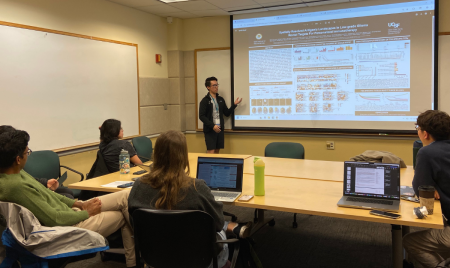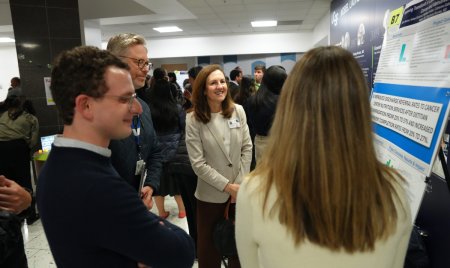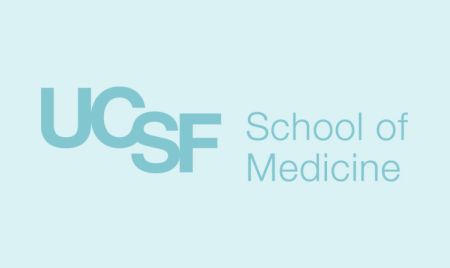Medical Student Podcast Sheds Light on Health Justice

Inaugural live podcast recording of Woke WOC Docs in Oakland September 27, 2019.
Three friends sit down on a Monday night after a full day of classes and studying. Music plays in the background as one of them jots down questions and ideas on the white board. In front of them lay mics and scattered cables, along with the haphazard dinner they had brought in. It has been almost a year since they started this biweekly tradition of recording their conversations about health justice and the narratives of womxn of color (WOC). Womxn is terminology used as an alternative spelling to women to be inclusive of transgender and non-binary people.
Woke WOC Docs, a podcast that highlights a health justice topic of interest in each episode, was created by Bernadette Lim and Nicole Carvajal, both third-year year students in the UC Berkeley-UCSF Joint Medical Program and Program in Medical Education for the Urban Underserved, which aims to support and equip medical students to effectively promote health equity. Lim and Carvajal host the program with Ivie Tokunboh, a second-year UCSF medical student. Womxn of color health activists and experts are invited to share their insights on the show. Through that lens, the podcast, available on iTunes, SoundCloud, and Spotify, aims to reveal insights on how medicine can help to end health injustices and promote well-being and healing.
The Woke WOC Docs podcast was an idea spawned from seeing the work of the The Freedom School for Intersectional Medicine and Health Justice in the community, said Carvajal. Together, she and Lim founded the Freedom School in January 2018. Sponsored by the Berkeley Center for Race and Gender, it is a learning and healing community space for people of all backgrounds to engage in an intersectional, inclusive, and justice-oriented medical education and public health practice, with a focus on those who are most marginalized. There are now over 200 people who regularly participate in their gatherings and in the wider community.
“Going into the podcast was an intentional step towards vulnerability and openness about being part of institutions that have historically excluded honest conversations about the intersections of community health, social justice, and the histories of womxn of color,” Lim said. The podcast also follows Lim’s journey of personal growth. Through word-of-mouth, social media, email listservs, and a grassroots virality, the podcast has gained over 500 subscribers in more than 50 countries and across the United States in cities including San Francisco, Los Angeles, New York, and Texas.
The podcast focuses on WOC in order to highlight how movements for the health, well-being, and healing of WOC exist at the intersection of many identities. Furthermore, the students aim to uncover the historical and grassroots community healing work by WOC that exist as sources of strength for communities that do not trust medical institutions because of their complicated and exploitative history with immigrants and communities of color.
Lim added that they aim to uplift the voices and work of WOC who are pushing boundaries and transforming frameworks of healing and well-being dominant in medical institutions.
“We initiate and highlight dialogue with WOC health justice activists and healers – from practicing physicians, researchers, teachers, and community activists and leaders...In this way, the podcast is truly a bridge between the community and medical institutions.”
Bernadette Lim
Student, UC Berkeley-UCSF Joint Medical Program and Program in Medical Education for the Urban Underserved
They are united by a commitment to justice, truth and liberation, Lim says. “Our future in health justice rests on acknowledging ancestral, indigenous wisdom, and integrating the strengths of Western medicine with the healing practices of our ancestors and communities that have carried humanity for thousands of years.”
The podcast uncovers some of the problems with traditional medical education, including a history of pathologizing Black and Brown bodies. Race has often incorrectly been seen as a risk factor for many diseases, and medicine does not adequately acknowledge the social and structural stressors (i.e. racism, income inequality, etc.) that contribute to health disparities and injustices. Many diseases characterized as "idiopathic" or of "unknown etiology" that disproportionately affect communities of color can be traced to the disproportionate experiences of physical and psychosocial stressors. Most of all, medical students are rarely given insight as to the community-centered forms of healing outside of Western medicine that have enabled many communities to build resilience, strength, and hope in the midst of violence and oppression.
The UCSF School of Medicine is constantly evolving and adapting curriculum to address historical inequities in health care. The recently revised foundational sciences curriculum, for example, includes a block on health and society, which focuses on disparities, health policy, social epidemiology and bias in medicine. Last year, the school also revised its competency milestones to require all students to graduate with competencies related to sensitivity to race/ethnicity and social justice.
Having just finished their summer series on critical health issues in the media such as the opioid epidemic, immigration border crisis, police violence, and black maternal health activism, Woke WOC Docs will go on tour to different cities across the US throughout fall 2019 and 2020. Their inaugural live podcast recording was in Oakland on September 27, and over 100 people attended.
“I hope that the stories shared on our podcast lead with love to create a much more inclusive health care system,” Carvajal said.
In addition to Woke WOC Docs, check out UCSF’s medical education podcast, The Spark: Medical education for curious minds, which presents the people and stories behind medical education at UCSF and its community of learners. That podcast can be found on Sound Cloud and iTunes.









